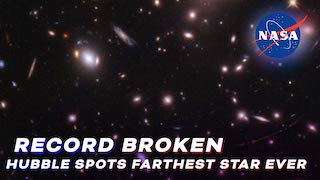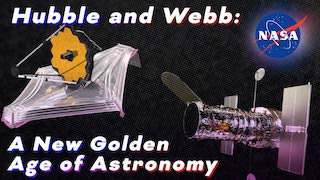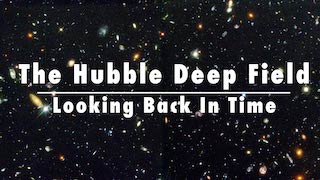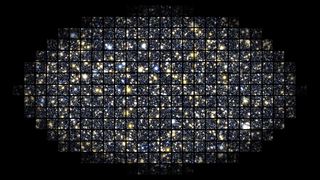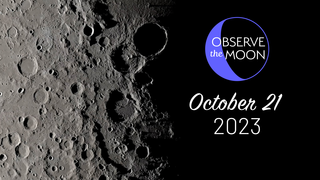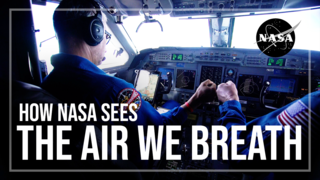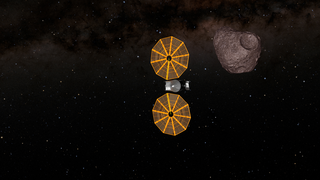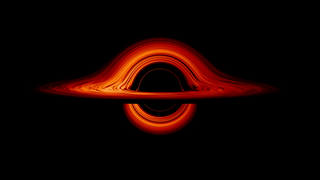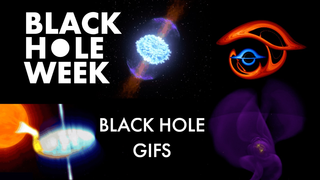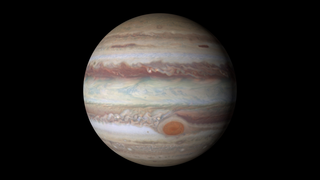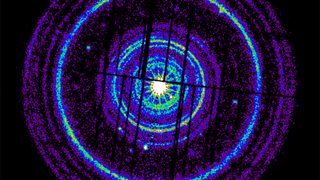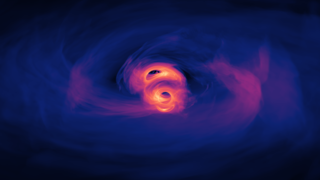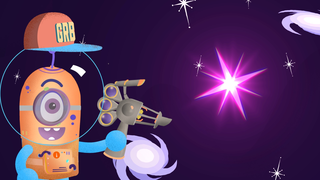Universe
ID: 14124

One for the record books! NASA just announced an exciting new finding from the Hubble Space Telescope – the farthest star ever seen in the universe. Nicknamed “Earendel” by its discoverers, this star's light took a whopping 12.9 billion years to reach us. That means we’re seeing the star as it existed just a few hundred million years after the Big Bang, which was about 13.8 billion years ago. This discovery smashes the previous record, a star discovered in 2018 by Hubble. Its light took 9 billion years to reach the telescope. Hubble was able to see Earendel due to gravitational lensing, a natural phenomenon that acts as a very powerful magnifying glass.
Read the release HERE!
Launched in 1990, Hubble has observed the universe for nearly 32 years, contributing to incredible discoveries and changing our understanding of astronomy. After upgrades from five servicing missions, Hubble is still going strong. Hubble plans to partner with NASA’s newly launched James Webb Space Telescope to study the sky across ultraviolet, visible, and infrared wavelengths. The two observatories together will investigate distant stars like Earendel, along with galaxies, exoplanets, and our own solar system.
Live interviews will be offered on the following days/times:
March 30, 2022 from 11:00 a.m. to 1:00 p.m. EASTERN TIME
March 31, 2022 from 6:00 a.m. to 12:00 p.m. EASTERN TIME.
Click here to request an interview: https://forms.gle/XFkswPGvRTi1FUqi9
Requests sent via the above form will have scheduling priority. We cannot guarantee a slot if the request is emailed.
Coordinates for Satellite Interviews:
HD Satellite Coordinates for G17-K16/Upper: Galaxy 17 Ku-band Xp 16 Slot Upper| 91.0 ° W Longitude | DL 12029.0 MHz | Vertical Polarity | QPSK/DVB-S | FEC 3/4 | SR 13.235 Mbps | DR 18.2954 MHz | HD 720p | Format MPEG2 | Chroma Level 4:2:0 | Audio Embedded
Suggested Anchor Intro:
The Hubble Space Telescope has been observing the cosmos for more than 30 years, and another incredible observation has just been released – the farthest individual star ever observed. Nicknamed “Earendel,” the light from this star has taken nearly 13 billion years to get to us. Here to talk to us about this incredibly distant star is NASA expert XX.
Suggested Questions:
1. Hubble observed the farthest individual star ever seen. Tell us about this extraordinary discovery!
2. Can you tell us how Hubble managed to observe a star so far away?
3. This star has been nicknamed “Earendel” which means “morning star” in Old English. What can we learn from Earendel or other really distant stars?
4. Hubble will be celebrating an important milestone in a few weeks – 32 years in orbit and 1.5 million observations and counting! How’s the telescope doing?
5. The James Webb Space Telescope just launched in December. How will Webb and Hubble work together to observe the universe?
6. Where can we learn more about Hubble?
Longer questions:
What else do we know about Earendel? How big is the star? How long will it be visible?
Can you tell us a little more about the evolution of stars? How were stars in the early universe different from stars now?
Did anyone ever expect Hubble to be able to see a star this far away? How much of a surprise is this discovery?
What future observations with Hubble and Webb are you most excited about?
Click here to learn more about the Hubble Space Telescope
Find Hubble on social media!! @NASAHubble
NASA’s Hubble Space Telescope Makes Record-Breaking Discovery Live Shots

New Record Broken! Hubble Space Telescope Spots Farthest Individual Star Ever Seen
One for the record books! NASA just announced an exciting new finding from the Hubble Space Telescope – the farthest star ever seen in the universe. Nicknamed “Earendel” by its discoverers, this star's light took a whopping 12.9 billion years to reach us. That means we’re seeing the star as it existed just a few hundred million years after the Big Bang, which was about 13.8 billion years ago. This discovery smashes the previous record, a star discovered in 2018 by Hubble. Its light took 9 billion years to reach the telescope. Hubble was able to see Earendel due to gravitational lensing, a natural phenomenon that acts as a very powerful magnifying glass.
Read the release HERE!
Launched in 1990, Hubble has observed the universe for nearly 32 years, contributing to incredible discoveries and changing our understanding of astronomy. After upgrades from five servicing missions, Hubble is still going strong. Hubble plans to partner with NASA’s newly launched James Webb Space Telescope to study the sky across ultraviolet, visible, and infrared wavelengths. The two observatories together will investigate distant stars like Earendel, along with galaxies, exoplanets, and our own solar system.
Live interviews will be offered on the following days/times:
March 30, 2022 from 11:00 a.m. to 1:00 p.m. EASTERN TIME
March 31, 2022 from 6:00 a.m. to 12:00 p.m. EASTERN TIME.
Click here to request an interview: https://forms.gle/XFkswPGvRTi1FUqi9
Requests sent via the above form will have scheduling priority. We cannot guarantee a slot if the request is emailed.
Coordinates for Satellite Interviews:
HD Satellite Coordinates for G17-K16/Upper: Galaxy 17 Ku-band Xp 16 Slot Upper| 91.0 ° W Longitude | DL 12029.0 MHz | Vertical Polarity | QPSK/DVB-S | FEC 3/4 | SR 13.235 Mbps | DR 18.2954 MHz | HD 720p | Format MPEG2 | Chroma Level 4:2:0 | Audio Embedded
Suggested Anchor Intro:
The Hubble Space Telescope has been observing the cosmos for more than 30 years, and another incredible observation has just been released – the farthest individual star ever observed. Nicknamed “Earendel,” the light from this star has taken nearly 13 billion years to get to us. Here to talk to us about this incredibly distant star is NASA expert XX.
Suggested Questions:
1. Hubble observed the farthest individual star ever seen. Tell us about this extraordinary discovery!
2. Can you tell us how Hubble managed to observe a star so far away?
3. This star has been nicknamed “Earendel” which means “morning star” in Old English. What can we learn from Earendel or other really distant stars?
4. Hubble will be celebrating an important milestone in a few weeks – 32 years in orbit and 1.5 million observations and counting! How’s the telescope doing?
5. The James Webb Space Telescope just launched in December. How will Webb and Hubble work together to observe the universe?
6. Where can we learn more about Hubble?
Longer questions:
What else do we know about Earendel? How big is the star? How long will it be visible?
Can you tell us a little more about the evolution of stars? How were stars in the early universe different from stars now?
Did anyone ever expect Hubble to be able to see a star this far away? How much of a surprise is this discovery?
What future observations with Hubble and Webb are you most excited about?
Click here to learn more about the Hubble Space Telescope
Find Hubble on social media!! @NASAHubble
Related
Credits
Michelle Handleman (KBR Wyle Services, LLC): Lead Producer
Aaron E. Lepsch (ADNET Systems, Inc.): Technical Support
Katrina Jackson (Advocates in Manpower Management, Inc.): Lead Producer
Christina Brooke Mitchell (KBR Wyle Services, LLC): Lead Producer
Jessica Sansarran (NASA): Lead Producer
Aaron E. Lepsch (ADNET Systems, Inc.): Technical Support
Katrina Jackson (Advocates in Manpower Management, Inc.): Lead Producer
Christina Brooke Mitchell (KBR Wyle Services, LLC): Lead Producer
Jessica Sansarran (NASA): Lead Producer
Please give credit for this item to:
NASA's Goddard Space Flight Center
NASA's Goddard Space Flight Center
Short URL to share this page:
https://svs.gsfc.nasa.gov/14124
This item is part of this series:
Narrated Movies
Keywords:
SVS >> HDTV
SVS >> Hubble Space Telescope
NASA Science >> Universe
https://svs.gsfc.nasa.gov/14124
This item is part of this series:
Narrated Movies
Keywords:
SVS >> HDTV
SVS >> Hubble Space Telescope
NASA Science >> Universe
